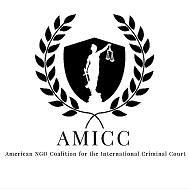A chain email in April called for opposition against President Barack Obama and against cooperation between the US and the International Criminal Court. This response corrects the general misperceptions of the Court among the American public that are reflected in this chain email and are so often encountered in our advocacy.
The email continuously refers to the “United Nation’s ICC” implying that the International Criminal Court is part of the United Nations and is subject to UN policies and decisions. However, the Court is independent, including independence from the United Nations and its politics. Instead, the Court answers to its constituting member States (State Parties), who have subjected themselves to the Court’s jurisdiction. The only way in which the UN Security Council exercises influence over the Court is through the Rome Statute’s instruction to the Court’s judges to accept Security Council requests to defer cases it believes to threaten international peace and security. Moreover, the Statute permits the Court to consider accepting cases the UNSC refers to the ICC concerning non-member States that it considers to be of sufficient importance and gravity to be subjected to ICC jurisdiction. It still remains the decision of the ICC Prosecutor whether to initiate criminal prosecution.
The email also suggests that the Court is able to arrest US troops independently. However, the ICC does not possess a police force to practically implement its decisions. Therefore, the Court relies on the cooperation of its member States in carrying out its arrest warrants. In calling on cooperation from States to do so, the Statute recognizes the importance of consular and diplomatic relations and of bilateral agreements between countries governing the treatment of foreign personnel present in a host country (so-called Status of Forces Agreements). Therefore, Article 98 of the Statute allows a member State to prefer these agreements over its obligations to cooperate with the ICC.
More important, the Court may only issue arrest warrants and prosecute when a member State claiming jurisdiction is in fact unwilling or unable to do so effectively itself. This is based on the complementarity principle in Article 17 of the Rome Statute. Consequently, if the US subjected itself to the jurisdiction of the Court, the US judicial system would always maintain primacy over the jurisdiction of the ICC in prosecuting international crimes. As long as the US appropriately accounts for the crimes committed by its personnel, the Court will not interfere with the judicial proceedings of the US. It has been proven that US law is apt to adequately prosecute the crimes under the Rome Statute. Therefore, there is in theory no reason for the Court to interfere with the US’ judicial system as long as it is willing and able genuinely to carry out the investigation or prosecution itself. The statement in the email that there will be no legal protections guaranteed under US law after becoming a member State is therefore invalid.
Even if a US citizen were to be the subject of criminal prosecution by the ICC because the US had failed to prosecute, the Rome Statute provides legal protections similar to US law with only minor differences in rules of evidence and trial by judges rather than jury. Thus, the statement in the email that there is no appeal from criminal indictments is also untrue, as the ICC allows for objections to charges and appeals to convictions in the different stages of the criminal process.
Finally, it should be noted that the Court applies a ‘gravity threshold’ in assessing whether to prosecute or not. Consequently, the Court will only pursue cases of which it believes to be of such gravity that they ‘deeply shock the conscience of humanity’ and ‘threaten the peace, security and well-being of the world’. This means that only those cases of severe gravity will be considered by the Court and individuals will not be subjected to the Court’s jurisdiction arbitrarily.
Read the analysis by Politifact of the chain email here.
Written by Laura van Esterik

